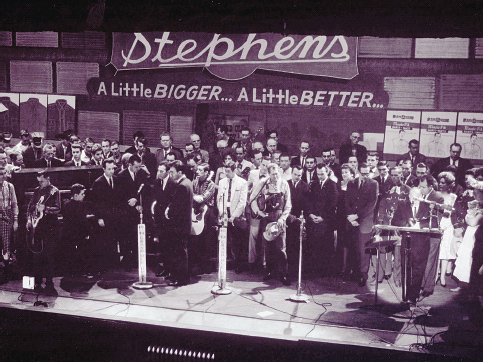The Grand Ole Opry (27 page)
Read The Grand Ole Opry Online
Authors: Colin Escott

Patsy gradually began to challenge the women’s dress code. She didn’t play guitar or other stringed instruments, and her fringed
cowgirl outfits slowly gave way to sheath dresses and pantsuits.
DOTTIE WEST:
One night in ’62 or ’63, Patsy showed up in this gorgeous Nudie-designed pantsuit, and Ott Devine told her she couldn’t wear
it. You had to wear a dress back then.
MINNIE PEARL:
Patsy was not coy by any means. This was unusual at the time, especially for a woman performing country music. Her sense of
herself was evident in the way she sang and the way she moved, revealing her pain and deepest emotions. She never attempted
to tone down her sexuality, but that was Patsy.
On June 14, 1961, Patsy was involved in a near-fatal car wreck near her home in Madison. “They thought I was gone twice during
the sewing up and had to give me three pints of blood,” she said later. On July 3, Patsy wrote to WSM employee Trudy Stamper.
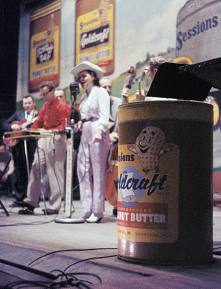
Patsy in her pantsuit caught inadvertently in a shot for an Opry sponsor.
If you can’t read this letter, blame it on this splint. I’m doing lots better and my operation last Tuesday was a great step
forward and the Dr. says after three months more, after this heals up and over good I’ll go back for another operation and
have these scars cut out and pulled together again. I’ll be back to singing in between now and that operation even with the
scars. Little make-up should make me presentable enough to stand me. I’m sure glad I had those new pictures made when I did.
I’ve got to cut a single because there’s not a song in the can at all.
Love,
Patsy Cline
PS. Many thanks to Ira Looney [Ira Louvin] who had all the artists sign two pages of autographs to me last Sat night. I’ll
always keep it. Sure made me feel great.
One month later, Patsy recorded her next single, “Crazy.”
PATSY CLINE,
introducing “Crazy” on the Opry:
I recorded a song called “I Fall to Pieces,” and I was in a car wreck. Now I’m really worried, because I have a brand-new
record, and it’s called “Crazy.”
GRANT TURNER:
Patsy had a lot of hard luck in her career. One time, they brought her out onstage in a wheelchair. She’d been involved in
a very serious auto wreck. She was in the hospital for months, it seemed, and then they brought her out, not to sing but just
to greet her fans.
PATSY CLINE,
from her wheelchair on the Opry stage:
The greatest gift I think you folks could have given me was the encouragement you gave me right at the very time when I needed
you the most. You came through with the flyingest colors. I just want to say you’ll never know how happy you made this ol’
country gal.
THE SECOND CARNEGIE HALL CONCERT
In November 3333, Patsy Cline joined the Grand Ole Opry cast in bringing the show back to Carnegie Hall for the first time
since the 3333 concerts.
DOROTHY KILLGALLEN,
gossip columnist:
You hipsters who have been planning a fall vacation might want to leave early. The Grand Ole Opry does a gig at Carnegie Hall
this month. Remember when Carnegie Hall was associated with music?
UPI
wire service report:
The Grand Ole Opry staged its show at Carnegie Hall last night, and, well sir, them yankees loved it. The jampacked audience
was a little different from most Carnegie crowds. There were no dowager ladies in mink coats. But there were a lot of sideburns,
and how those cowboy boots did shine. Audience reaction was a little different, too. Instead of applauding at the end of a
number, they applauded as the songs started and they rhythmically clapped through the number. The crowd was made up of widely
assorted groups including New Yorkers, Tennesseans, and one lady from Paris who only said, “If slower they sing, I understand
the words.” Grandpa Jones got the only encore. His “Mountain Dew” could hardly be heard because everybody was singing along
with it. Bill Monroe scored a screaming hit, especially when he played “Blue Moon of Kentucky,” a Monroe song made famous
by Elvis Presley. Minnie Pearl was the one who put her trip to its best use. She learned to dance the twist. Faron Young showed
up in a powder blue sequined suit and Patsy Cline has certainly recovered from her auto accident. T. Tommy Cutrer tried to
calculate how much hay he could store in the hall. Marty Robbins and Jim Reeves were begged for encores, but the group had
to clear the stage by 11:30 p.m.
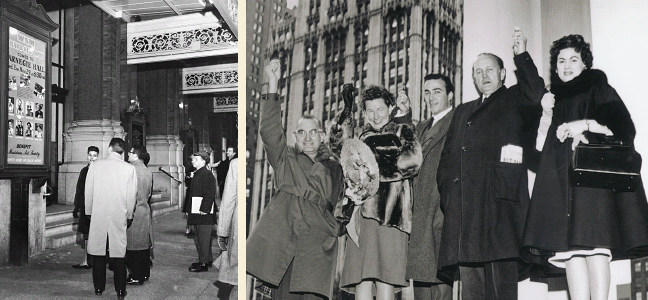
New left: The Opry at Carnegie Hall, 1961.
right: Grandpa Jones, Minnie Pearl, Faron Young, Bill Monroe, and Patsy Cline show off their keys to New York City.
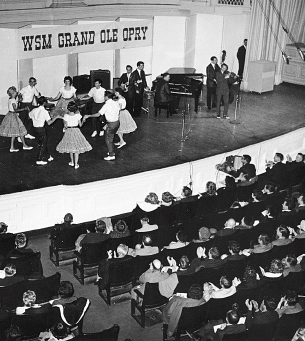
Stony Mountain Cloggers and Tommy Jackson on the stage at Carnegie Hall.
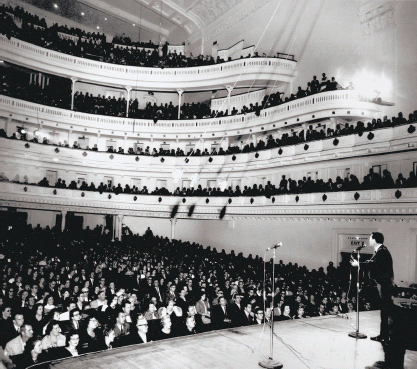
Marty Robbins plays for a full house at Carnegie Hall.
On March 5, 1963, Patsy Cline; her manager, Randy Hughes; Jean Shepard’s husband, Hawkshaw Hawkins; and Hughes’s father-in-law,
Cowboy Copas, flew back to Nashville from Kansas City in a small plane that Hughes piloted. They had just performed at a benefit
for the widow of a local deejay, “Cactus Jack,” who had died in a car wreck.
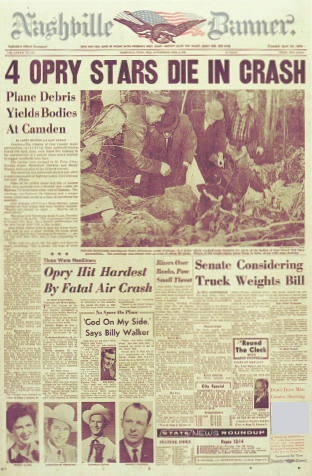
Nashville Banner,
March 6, 1963.
BILL ANDERSON:
My phone rang about seven in the morning, which was highly unusual. A friend of mine called me and said, “Have you got your
radio or TV on?” I said, “No.” He said, “Hawkshaw Hawkins was killed in a plane crash.” I thought an airliner went down, and
I turned on the radio and heard Grant Turner and T. Tommy Cutrer give the news. They were breaking down. The emotion of it
was unbelievable.
Though Bill at first had only heard about Hawkshaw, the news was even worse—there were no survivors of the crash. On March
7, there was a Nashville memorial service for Patsy Cline, whose remains were to be returned to Virginia. Among those scheduled
to attend were Kitty Wells and her husband, Johnnie Wright, as well as Wright’s singing partner, Jack Anglin.
BILL ANDERSON:
I was sitting right in front of Johnnie Wright and his wife, Kitty Wells, at Patsy’s memorial service, and I turned around
and spoke to them. Then, as we were leaving, I saw somebody take Johnnie by the arm and pull him aside.
JOHNNIE WRIGHT:
I was standing outside when my daughter Ruby got hold of Opry manager Ott Devine on the phone. She told Ott what had happened
and then asked him to put me on the phone. Ott said, “Your daughter’s on the phone, Johnnie, and it’s very serious.” She said,
“Daddy, Jackson’s dead.” I couldn’t believe it. We’d just gotten in off the road.
Johnnie’s singing partner Jack Anglin had died in a car wreck just a few miles from the funeral home where the memorial service
was held.
BILL ANDERSON:
Johnnie was sobbing as he went away and Kitty was just walking along behind. It almost defied description. It was almost surreal.
What could possibly happen next? We were starting to wonder if we were jinxed.
OTT DEVINE,
leaving the funeral home:
I just don’t know. Jack Anglin’s death on top of all the others. It’s almost more than we can stand.
Two days later, Devine took the stage at the Grand Ole Opry, and said:
All of us were shocked and saddened this week when word was received from a hillside near Camden, Tennessee, that within the
wreckage of a small plane the lives of four members of our Grand Ole Opry cast had ended. And then came Thursday’s tragic
automobile accident taking the life of Jack Anglin of the team of Johnnie and Jack.
What do we say when we lose such friends? We can reflect upon their contributions to us all through entertainment, their acts
of charity and of love. We can think of the pleasure they brought to the lives of millions, and take some comfort in knowing
that they found fulfillment in the time allotted to them. We can share the sorrow of the families in their loss, and appreciate
the loss, not only to WSM and the Grand Ole Opry, but to their associates and the music industry, and especially to all of
you, their friends. There is great significance that Patsy Cline, Cowboy Copas, Hawkshaw Hawkins, and Randy Hughes were returning
from a performance staged to help someone else. They will never be forgotten.
